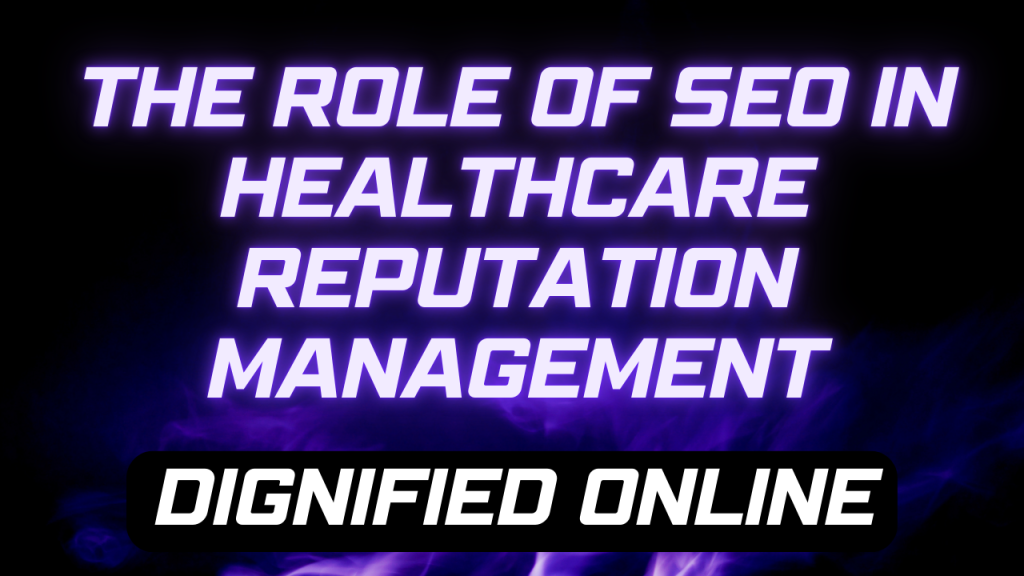You can’t manage what people can’t find. In today’s digital world, healthcare providers are increasingly judged not just by their clinical outcomes or bedside manner, but by what shows up when a prospective patient types their name into Google. Search engine optimization (SEO) has emerged as a vital tool in shaping that first impression. From highlighting positive reviews to suppressing outdated or misleading content, SEO is the cornerstone of effective healthcare reputation management—and firms like Dignified Online are helping providers take control of the narrative.
Why SEO Matters in Healthcare
Healthcare is a high-stakes industry. People aren’t just looking for a good service; they’re looking for trust, expertise, and care. When a patient searches for a doctor, clinic, or hospital, the results on page one of a search engine can heavily influence their decision.
Unfortunately, the internet never forgets. An outdated news article, an old lawsuit that was resolved favorably, or a single negative review from a dissatisfied patient can linger in the top search results for years. Even if your practice has improved, hired new staff, or rebranded entirely, these old links can keep showing up unless actively managed.
That’s where SEO steps in—and why healthcare providers turn to Dignified Online for help.
SEO as a Reputation Management Tool
SEO involves optimizing online content so it appears higher in search engine rankings. For healthcare providers, this means ensuring that relevant, accurate, and positive content surfaces first. Here’s how SEO can directly impact healthcare reputation management:
1. Promoting Positive Content
A well-structured SEO strategy prioritizes high-quality, positive content—such as glowing patient testimonials, blog posts showcasing medical expertise, and media coverage highlighting community involvement. Dignified Online works with healthcare clients to produce and optimize this kind of content, ensuring it climbs to the top of search engine results.
By pushing favorable narratives to the front, SEO ensures that the most recent and relevant information is what prospective patients see first.
2. Suppressing Negative or Outdated Information
Not all negative content can be removed from the internet, but it can be pushed down in search rankings. This process is known as content suppression, and it’s one of Dignified Online’s specialties. Using a mix of SEO tactics—like backlink strategies, on-page optimization, and content diversification—they can outrank harmful or misleading search results.
The goal isn’t to erase criticism but to contextualize it with more accurate and updated information. In the ever-evolving field of healthcare, that’s essential.
3. Increasing Visibility for Branded Searches
When someone searches for a specific provider or clinic, it’s called a branded search. These are the most critical queries in reputation management because they indicate a user is already interested. If negative reviews or irrelevant third-party listings dominate the first page, it can quickly erode trust.
Dignified Online helps healthcare organizations claim and optimize branded assets, like Google Business Profiles, LinkedIn pages, and healthcare directories, ensuring consistent branding and relevant information across all platforms.
4. Strengthening Local SEO
For private practices and clinics, local SEO is essential. Patients typically search for providers “near me” or in a specific region. By optimizing local listings, managing citations, and ensuring name-address-phone (NAP) consistency, Dignified Online helps healthcare providers dominate local search results—an essential step for building a positive local reputation.
5. Mitigating Damage from Review Sites
Sites like Healthgrades, RateMDs, and Yelp often rank highly in healthcare-related searches. While you can’t control every review, you can optimize your profile, respond professionally to criticism, and guide patients to leave positive feedback. Dignified Online offers guidance on best practices for managing these profiles and can even monitor and alert providers to new reviews or reputation risks.
A Long-Term Strategy for a Long-Term Impact
Reputation management isn’t a one-time fix—it’s an ongoing process. SEO, by its nature, is a long-term strategy that builds credibility and trust over time. This is especially important in healthcare, where reputations are built (or broken) slowly and consistently.
Dignified Online understands the nuances of healthcare SEO. With years of experience in online reputation management, they provide tailored solutions that go beyond keyword stuffing or superficial fixes. They dig deep into a provider’s digital footprint, analyze risks, and build a resilient, positive presence that stands the test of time.
Final Thoughts
In healthcare, perception matters. A provider’s online reputation can be the deciding factor for patients seeking care. If outdated or negative content dominates search results, even the best clinicians can suffer reputational harm.
That’s why SEO is more than just a marketing tactic—it’s a reputational safeguard. And with experts like Dignified Online leading the way, healthcare providers can rest assured that what people find online truly reflects the quality of care they offer.
Because remember: you can’t manage what people can’t find.

